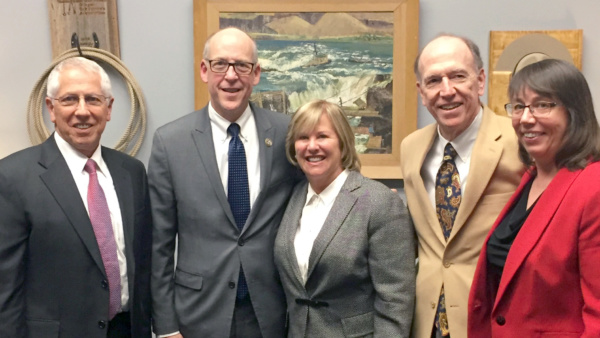NNDC Goes to Washington, DC
On February 14th, members of NNDC’s executive leadership traveled to Washington, DC, to brief several members of Congress, including Chairman of the House Energy and Commerce Committee Greg Walden, on the state of research funding for depressions and other mood disorders.
Representative Walden was very welcoming and encouraged us to continue educating our legislators on the importance of funding large-scale, collaborative research efforts for depressions, bipolar illnesses, and related disorders. Read on below to learn about some of the issues we covered.

From left to right: John Greden, MD; U.S. Rep. Greg Walden; Holly Kastan, MSW; Ray DePaulo, MD; Pat Rinvelt, Exec. Dir. NNDC
Path to Depression Cures


Depression is the leading cause of disability in the United States among people ages 15-44
Suicide is the 2nd leading cause of death in the United States among people ages 15-44

Lost earnings per year due to serious mental illness

90% of suicides can be traced back to an underlying mental illness
Disease Mortality Rates for Ages 10-24

A Path to Cures Exists: A Model That Works
In 1971, President Nixon signed the National Cancer Act which led to the authorization of $1.5 billion to establish a National Cancer Program. As a result of this and other significant developments that followed, many of the most prevalent cancers have seen a significant reduction in mortality rates. On the other hand, Suicide Rates have actually gone up in recent decades. The National Comprehensive Cancer Network, a nonprofit organization that grew from the foundation laid by the National Cancer Act, has been a pivotal force in advancing the field of cancer research and treatment. The NNDC is ready to do the same for depressions, bipolar illnesses, and related disorders.

Funding: A Key Requirement to Developing New Cures
Large-scale, collaborative efforts have improved outcomes for patients suffering from many of the nation’s top health concerns. Unfortunately, due to a lack of major federal funding, that is not the case for depression and related illnesses. The founding members of the NNDC identified a model that works and set out to bring the promise of personalized treatments to patients suffering from mood disorders. However, more support is needed to do this. The NNDC currently receives zero federal funding.

We lose as many people to suicide each year as we do to breast cancer, but depression research receives only 1/100 the funding breast cancer receives annually

Preparing for a Future of Cures: Fund Discoveries, Save Lives, & Reduce Costs
The National Network of Depression Centers believes that, with the same level of support for mood disorders research, the US will see a reduction in deaths by suicide and an overall improvement in access to quality care for people living with depressions, bipolar disorder, and other related illnesses. The proof is in the remarkable success of the National Comprehensive Cancer Network.
The groundwork for this has been laid already – the ENHANCED Act was passed in 2010 as a component of the Affordable Care Act, paving the way for a federally-funded network of Centers of Excellence for depression. However, the Affordable Care Act failed to provide funds through the ENHANCED Act to the NNDC, the first and only collaborative network of Depression Centers of Excellence. As the new administration navigates how best to handle healthcare in the United States, we have a new opportunity to advocate for federal funding for depression research. For info on how to get in touch with your congressmen and what to say when you do, please e-mail [email protected].